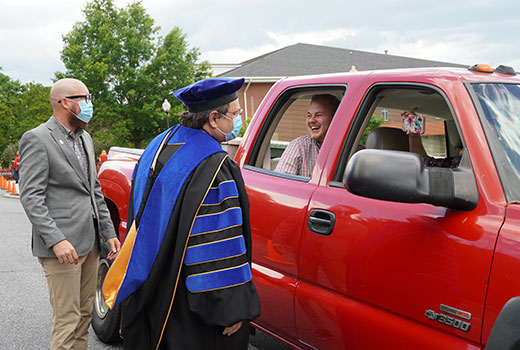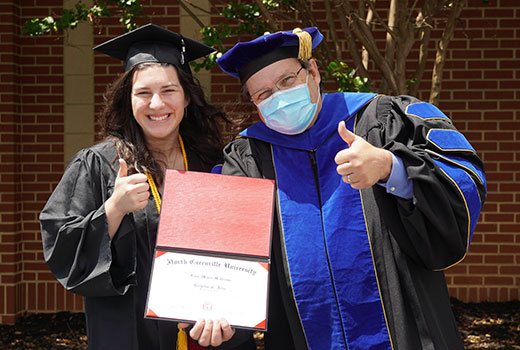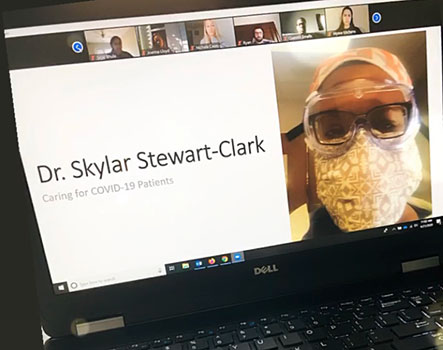Graduation from South Carolina Baptists’ three universities looked very different this May.
At Anderson University, a page on its website was developed for the commencement program, including the names, hometowns, degrees and academic honors. The page also included videos from the university president and featured the school’s concert choir, virtually performing “I Know the Plans I Have for You,” with each of the students singing from their own homes.
Charleston Southern University hosted a virtual commencement ceremony to recognize achievements of the class of 2020. CSU’s faculty also is looking forward to holding an in-person celebration later this year.

NGU President Gene Fant congratulated graduates as they drove through the Tigerville campus to pick up diplomas.
While North Greenville University decided to cancel its May service, an alternative celebration for graduates is in the works as part of homecoming activities on Oct. 17. The university held a special event in May when graduates could drive through the campus to pick up their diplomas and regalia.
All three schools took necessary health precautions in March, returning students to their homes and allowing faculty and staff to work from home. Classes quickly were moved to online platforms, and staff meetings were conducted using Zoom or similar video conferencing apps.
“The primary impact of the [coronavirus] outbreak has been disruptions at every level,” said NGU President Gene Fant. “As a university, we have many online programs and non-traditional degrees that we do incredibly well, but our signature program — the one that South Carolina Baptists support most strategically — is our traditional, residential undergraduate program,” he added. “The outbreak has made what we do best impossible to do the usual way, but we have figured out many ways to continue to make significant impacts on students, both academically and spiritually.”
CSU President Dondi Costin said, “Charleston Southern has shown remarkable resilience and response during this pandemic. Thanks to a cadre of highly skilled faculty and staff, and a campus full of resilient students, we turned on a dime to transition from in-class to remote education in a matter of days.
“Classes didn’t miss a beat, and our student life, student success, and communication teams ensured that community building and spiritual growth took place in amazing ways,” he added.
Still, the campus shutdowns are having a financial impact on the universities. In addition to refunding unused room and board charges to students, they are losing income from spring athletic events that have been canceled and from summer camping programs that were canceled or delayed. Further compounding the financial setbacks, the stock market’s downturn has caused endowment investments to be devalued.
Because of these factors as well as the unknown, even if school enrollments are fairly healthy this fall, the financial pressures on the three universities could make the coming year a financially challenging one.
“We have not had to make any staffing or salary adjustments up to this point,” said Anderson President Evans Whitaker. Still, the likelihood hasn’t been ruled out, and school officials at all three universities are forming contingency plans should the national economy and student enrollments not rebound strongly.

It wasn’t exactly the commencement ceremony the Class of 2020 had anticipated, but graduates were proud of their accomplishment just the same.
“NGU runs a pretty lean ship and carries no bank-issued debt in order to keep our tuition as low as possible, so we have been able to navigate thus far without any employee furloughs, program cancellations, or other significant adjustments,” President Fant said. “We are planning for various scenarios for the fall, some of which would require budgetary adjustments. But it’s too early to know what they will be.”
Should it become warranted, “we will cut where we need to cut, but we’ll continue to pursue priorities that are true to our mission and in keeping with our strategic plan,” CSU President Costin assured.
“We are in a strong position financially, but the margins in higher education are generally quite thin,” Costin said. “As responsible stewards of the resources the Lord has given us, and to ensure we are prepared to weather this entire storm, we have reduced spending, continued a hiring freeze for all but the most essential positions, and scaled back capital projects that can be expanded once the pandemic passes.”
For instance, a new engineering and science building project at CSU will continue, but at two-thirds its original planned size. The bulk of the building will be completed as scheduled so that the university’s new engineering degree programs will continue their path to accreditation.
At Anderson, all but two essential construction projects have been postponed. But perhaps more disconcerting for President Whitaker is that the families of some students have lost jobs and income due to the coronavirus, and they may need more financial aid this coming year to be able to return to college.
“While church budgets are negatively impacted by this virus, too,” Whitaker said, “we pray for individual Baptists to give to our COVID-19 Relief Fund to help us keep a Christian college education available to students whose families have lost their incomes or had them reduced.”
Even so, university faculties and students alike are eager for school campuses to reopen.
“Most of our students tell us they are counting on us opening the campus this fall,” Whitaker said. “They want to be back.”
But exactly what campus life will look like then remains to be seen.
“We anticipate campus life will be deemed ‘a new normal,’ with physical distancing, temperature checks, antibody and/or virus testing if financially feasible, use of masks” as possibilities, Whitaker said.
“We’re closely monitoring guidance from local, state and federal officials, and are consulting with a variety of experts across our community and state as we make plans to welcome students to campus in August,” Costin said. “Lord willing, we’ll be prepared for whatever contingency we face by having plans ready to provide safe social distancing in the chapel, residence halls, dining hall, classrooms, and athletic facilities.
“In a phrase, come August we have every intention of being completely open for business — in whatever configuration is required to prepare servant leaders to pursue significant lives,” Costin said.
Still, all three presidents requested the prayers of South Carolina Baptists for their universities and students.
“Students meet Christ on our campuses, and they grow in their walk with Him. That happens most often when students are on campus, not as much online,” Whitaker said. “Pray for our students to continue to meet and grow in Christ during these days. Beyond that, we need to be able to open our campuses strongly this fall.”
“Churches can continue to pray for the SCBC’s three universities as we make plans and balance budgets going forward,” Costin said. “And they can hear us say how much we treasure the Cooperative Program dollars they send our way so that students can have the kind of unapologetically Christian education we provide in community.
“Finally, they can send their students to one of these God-honoring universities with full confidence that it will be the best starting point for their lives, careers and futures,” he added.


